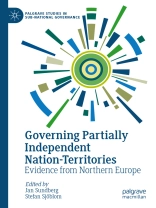This book assesses the quality of self-government in four northern European regions with strong autonomy rights. Examining the experiences of Scotland, the Faroe Islands, Greenland and the Åland Islands, it considers how these regions have developed their own political and administrative systems within the larger states they form part of. The book looks to understand the key democratic and administrative qualities of a functioning self-government, and how geographic size and economic and human resources can impact the ways in which partially independent territories govern. It also assesses the emotional dimensions of regional nationalism, and how this impacts the concept and public perception of partially independent nation-territories. By focusing on the quality of self-government within these nation-territories, the book considers whether strong autonomy contributes to peaceful co-existence within established national borders, or provides new munition for secessionist movements. It will appeal to students and scholars of sub-national governance, European politics, territorial politics and conflict management.
表中的内容
Chapter 1.- Introducing Partially Independent Nation Territories.- Chapter 2.- Credibility Explanations for the Success of Ethnoautonomy Arrangements. Chapter 3 -The Quality of Large and Small Nation Territory Governments.- Chapter 4.- Good Governance’ and Entrenched Self-Government in Scotland: A Success?.- Chapter 5 -The Capacity of Self-Government in Greenland.- Chapter 6.- Faroese Self-Government: A Disputed but Evolved Model.- Chapter 7.- The quality of Self-government in the Åland Islands.- Chapter 8.- Is it better for nation territories to stand on one or two feet?
关于作者
Jan Sundberg is Professor Emeritus in Political Science at the Swedish School of Social Science, University of Helsinki, Finland. His research interests include ethnic politics, political sociology, party organizations, local politics, Scandinavian politics, and self-government.
Stefan Sjöblom is Professor of Local Administration at the Swedish School of Social Science, University of Helsinki, Finland. His main research interests are local and regional development, administrative reform policies, and hybrid forms of governance.












